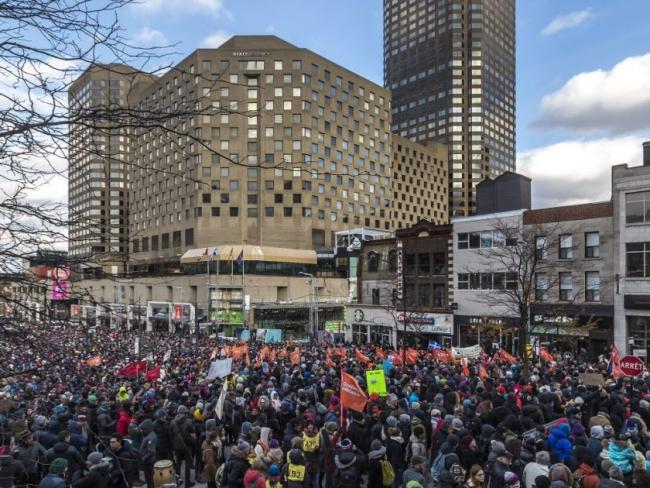It’s hard not to feel despondent, powerless and alone these days when it comes to the high-stakes battle against climate change.
The science about the declining health of the planet is bleak and gets bleaker by the week. With time running out to make the drastic changes needed to stave off the worst effects of global warming, many world leaders and decision makers are still in denial about our pending doom. Facing such odds, we as citizens are left wondering how the small steps taken by ordinary people can possibly make a difference. So we wallow in the futility of trying to save the planet.
But there is new reason for hope. A mass mobilization calling for immediate action on climate change in Quebec is now underway to harness this sense of helplessness. Within the space of a few weeks, a grassroots initiative to combine individual deeds with a demand for sweeping government measures has seen a groundswell of support that brought
50,000 Montrealers to the streets over the weekend.
Over 175,000 Quebecers have signed the
Pact for Transition, at once a petition directed at political leaders and a personal undertaking to wean ourselves off fossil fuels. The goal is to reach 1 million names. More
than 500 prominent Quebecers, from filmmaker Xavier Dolan to Cirque du Soleil founder Guy Laliberté, have given their endorsement.
Theatre producer Dominic Champagne, the mastermind behind it all, is amazed at the rapid public response.
“It’s really a spontaneous movement,” he said Monday in an interview. “We’ve given birth to a monster.
It all began just three weeks ago at a private gathering of friends and family where Champagne “confessed” his angst over climate change. But he quickly realized the deep well of shared concern waiting to be tapped, a chasm of despair that transcends the usual dividing lines in society.
“This time it’s not just left-wing ecologists and artists. It’s way larger,” he said. “This is really fulfilling an empty space on the political landscape.”
Garnering 125,000 signatures in 48 hours also won
Champagne an audience with Premier François Legault before the demonstrations even occurred. Champagne emerged “optimistic” from the meeting Friday. Three Coalition Avenir Québec cabinet ministers, including Environment Minister MarieChantal Chassé, participated in the Montreal event.
He said he told the premier — who hardly mentioned climate change while campaigning but vowed to make it a priority after his victory — that he needs help.
“We’re trying to be more like a great source of inspiration for our government rather than an anti-whatever,” he said. “I believe in the power of the popular will… I think it’s important that there is a grassroots. It has to come from the bottom and from the top. It can’t only be laws, but it also must be laws.”
Champagne is a veteran of the battle against shale gas exploitation in Quebec. But he said climate change is a different kind of enemy that will take a “war effort” to tame — which rightly implies personal and societal sacrifice.
The Pact calls for Legault to: enact a plan by 2020 for reaching Quebec’s climate targets; commit to reducing emissions by 50 per cent by 2030; develop an energy efficiency and electrification strategy; rule out any exploitation of fossil fuels in Quebec; and make climate change the first consideration of every policy.
After all, it is only through radical, co-ordinated and societal transformation that our future can be secured.
But what makes the Pact particularly powerful is that it also commits signatories to making changes in our own lives, to the best of our abilities. Signing constitutes a solemn pledge to cut down on driving or give cars up entirely; eat less meat or abstain altogether; eschew plastics, excess packaging and mindless consumption; and take an eye-opening measure of own ecological footprint.
Champagne calls it a “new social contract.”
“We cannot go on speaking out of both sides of our mouths,” he said. “We cannot keep saying one thing and doing another.”
To see such a large scale movement take shape so quickly is heartening. To be able to join our personal efforts to a wider groundswell is empowering. Individual actions won’t solve this — but they do add up. We’re all in this together. We must all do our part.
Only by raising our voices as one will political leaders get the message. It may finally be dawning on Legault that climate change is the defining issue of our time. We must not let him forget this over his mandate. We must show that we expect action to match words.
More marches are planned to coincide with the Nov. 27 return to the National Assembly and the United Nations climate change talks in Poland next month.
The magnitude of challenge must be met with a global mobilization, but Champagne has created a welcome outlet for Quebecers to express their hopes and fears.
“We’re only 8 million, but I think we can be a great example and inspiration for the rest of the world.”
RELATED
[Top photo: More than 50,000 marched in Montreal on Saturday in one of several climate-change demonstrations organized in Quebec by the Planet Goes to Parliament / Planète s'invite au parlement. DAVE SIDAWAY / MONTREAL GAZETTE]

